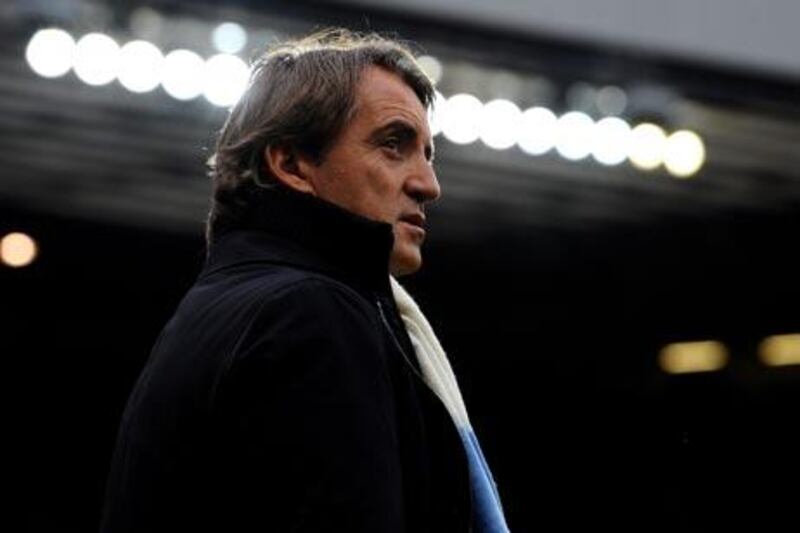To a man as intensely partisan as Sir Alex Ferguson, it will not appear a compliment. However, the Manchester United manager has given the neutrals huge entertainment.
Premier League in pictures
The best images from week nine of the Premier League.
Consider the start to this season and two Premier League results are so startling that they will be etched in the mind for years to come, United's 8-2 victory over Arsenal and their 6-1 defeat to Manchester City.
While both could be replayed 100 times without producing the same score line, Ferguson's tactics nevertheless made such wildly contrasting outcomes possible.
Yet the blend of a gung-ho commitment to attack and a casual approach to defending was always risky. Ferguson acknowledged as much at Anfield 10 days ago when he flooded the midfield, kept his premier attackers in reserve and played for a point against Liverpool.
He got it, but the chance to put City in their place in front of a packed Old Trafford called for a statement.
Ferguson cast negativity aside and brought back his buccaneers. It was a decision that backfired so dramatically that the resident statisticians, detailing the milestones, became still busier than David de Gea, who retrieved the ball from his net six times.
Roberto Mancini is not an instinctive cavalier, but a calculating character who sensed frailty. Explaining his thinking, the City manager referred to the number of chances United's opponents have been afforded - now 91 in five games at Old Trafford alone - and opted to play with two strikers.
He dispensed with his premier defensive midfielder, Nigel de Jong - with City not needing his services, how United could have done with the Dutchman - and exposed fault lines in both the components and the structure of Ferguson's formation.
By playing 4-4-2 with two out-and-out wingers, Ferguson has turned the clock back to his first great team, in 1994. English football has changed since then, however, and that leaves a side liable to being outnumbered in the centre of midfield.
With the roaming David Silva and James Milner, nominally the right-sided player but tactically excellent in moving infield, City sometimes had four players to United's two in the middle of the pitch. Silva can be elusively influential even without being handed such an advantage. As it was, he played a prominent part in four goals.
The Spaniard is the closest thing to a Barcelona player outside of Camp Nou. The Champions League winners seem to have prompted a rethink from Ferguson.
Since May's Wembley whitewash, his defensive wingers, Antonio Valencia and Ji-sung Park, have been displaced by the attacking alternatives, Nani and Ashley Young. They account for goals scored and conceded alike, with Young failing to track Milner for City's second.
Inside him, Anderson and Darren Fletcher were unimpressive, but hardly helped by the system, as collectively United's midfield failed to afford the defence the protection they required.
Instead, weaknesses and poor decision making were highlighted. Ferguson's faith in the sent-off Jonny Evans appears misplaced. The Northern Irishman lacks presence and, as he showed in the manner of his exit, judgement.
Alongside him, Rio Ferdinand can creak; almost 33, injuries have taken their toll. He was excellent at Anfield in a tighter unit, but when United went down to 10 men on Sunday, he was powerless to halt the City surge.
Moreover, Ferdinand, like his eventual partner Chris Smalling, tends to be at his best alongside Nemanja Vidic. The Serb was not deemed ready and sat glumly in the stands, but this was a game when even a semi-fit Vidic would have been an asset.
Absence can tend to elevate a reputation but Vidic's, as the Premier League's outstanding defender last season, was high already. It seems safe to assume that, if at all possible, he will return at Goodison Park against Everton on Saturday.
Ferguson was incredulous that, trailing 4-1, his fullbacks pushed on, leaving three City attackers against his two remaining defenders. Perhaps dreams of United's most improbable comeback of all propelled them onwards, but Patrice Evra had been culpable before then.
It is often a damning indication of a full-back when opponents' goals originate on his flank and, even before United's injury-time capitulation, two of City's goals had begun on the visitors' right wing.
He, like Vidic and Ferdinand, has been one of the constants of arguably Ferguson's finest defence. But they were drilled by Carlos Queiroz, and while United remained frugal for two seasons after the assistant manager's exit in 2008, the past 14 months have featured more mishaps at the back.
It may be a time of transition, with the generation of Smalling, Phil Jones and the da Silva twins preparing to take over from the stalwarts of Ferguson's Indian summer, but organisation is as important as individual talent. United had prospered with a free-form arrangement against Arsenal and Chelsea, but a greater sense of regulation is needed now.
Previously indulgent of his charges' carefree attitude, Ferguson needs to impose order. It is something he has done extraordinarily well before. The last time United's defence was breached six times, in 1996 at Southampton, came the week after they had shipped five goals at Newcastle.
And that season, as he knows all too well, they recovered and went on to win the title.






